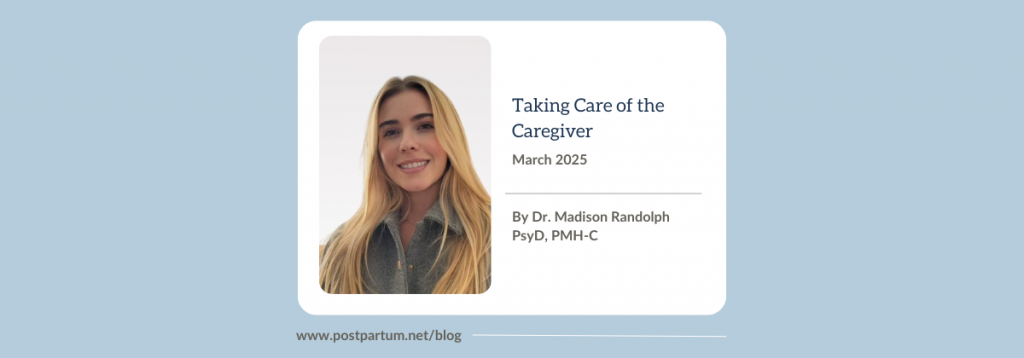By Dr. Madison Randolph, PsyD, PMH-C
Any veteran or first-time caretaker can relate to the difficulties of caring for another human life. The responsibilities associated with caring for a baby can feel overwhelming and daunting. Whether you are the birthing parent or not, the anticipation, the loss of sleep, role transition, and pure excitement of it all can leave you with an empty cup. When a caregiver experiences these mentally taxing conditions, their “empty cup” may prevent them from creating time for themselves. It may feel like there is no time, or that the spare time you can use for yourself is better used cleaning, caring for other children, cooking, or taking care of other tasks you have not been able to achieve throughout the day.
However, the most important task is missing, the task of taking care of the caregiver. Many caregivers may feel guilty taking time away to do something for themselves. However, challenging that voice in your head is vital in making sure you are caring not only for those around you but also for yourself. It is not selfish or wrong to take intentional time to take care of YOU! In fact, it is essential. As a clinical psychologist, certified perinatal mental health provider, and new mama, I have put together an easy-to-remember acronym that includes the most useful tools for you, as a caregiver: CARE: Compassionate, Acts, Reinforced, Every day.
Filling up your cup
As a caregiver, the idea of filling up your own cup, or in other words, taking care of yourself, may feel like a sweet but unrealistic fantasy. However, I am here to tell you that it is the most important thing you can do as a caregiver. When you fill up your cup, you can pour into the cups of those you are caring for. Now how does this “filling up my cup” work, you may ask? It can begin in small ways.
Mindfulness
Mindfulness is a wonderful way of taking a moment for yourself, without feeling like you must dedicate more time than you feel is manageable as a busy caregiver. Mindfulness can be achieved in various ways, through meditation, body scans (noticing/connecting with your body, emotions, and physical sensations from head to toe), walking, eating, reading, yoga, or even journaling. All these small, mindful acts can create a significant and positive ripple throughout your life. Additionally, not only is mindfulness a great way to fill up your cup, but studies have also shown its effectiveness in combating stress and perinatal mental health disorders like postpartum depression.
Exercise
As a busy caregiver, exercise may be the last thing on your mind, but it can be a useful and helpful way of relieving negative mental health symptoms. Exercise is a wonderful way to take care of yourself both physically and mentally. It can start with 30 minutes a day of moving your body. Simple ways to incorporate exercise into your routine can look different for everyone. Taking a walk, putting on a workout video at home, or meeting up with a friend for a hike are all fantastic ways of integrating exercise into your life.
Socializing
Social support or spending time with loved ones is an important aspect of taking care of the caregiver. The saying “it takes a village” not only applies to caring for a new baby but also to you, the caregiver. Utilizing social support is crucial for decreasing negative mental health symptoms and increasing positive well-being among caregivers. Do not be afraid to reach out to those who love and support you, as well as reach out to new people or groups. Whether you engage with friends, family, or new or existing groups, connecting with others outside of the caretaker role can be highly beneficial.
Self-care activity
Everyone hears the phrase “self-care,” but what does that mean? Self-care can mean something different for everyone. Self-care could be grabbing your favorite coffee drink on a Wednesday morning or putting on a facemask before bed. Self-care can really look like anything. The purpose of self-care is to show yourself love and compassion. When doing self-care, we are acting with intention and prioritizing ourselves in that moment. For you, what does that look like? Is it words of affirmation to start your morning, getting a manicure, or perhaps it’s that guilty pleasure reality show to end your day? Whatever it is, do it! Your cup will thank you later!
Psychotherapy
As a proponent of mental health and psychotherapy, meeting with a mental health provider to discuss your thoughts and feelings can be extremely useful. Especially, with all the challenges you face as a caregiver. Sometimes having someone that you can talk to without fear of judgment or bias can be essential. Additionally, gaining useful tools and having additional support can be crucial to managing your role as a caregiver. Psychotherapy is a way to take care of yourself, prioritize your mental health, and have a dedicated space to process all of life’s challenges.
Whichever tools or strategies you decide to implement in your life, make the intention to take care of yourself. When in doubt remember to CARE (Compassionate, Acts, Reinforced, Every day) for yourself!
References
Sheydaei, H., Ghasemzadeh, A., Lashkari, A., & Kajani, P. G. (2017). The effectiveness of mindfulness training on reducing the symptoms of postpartum depression. Electronic physician, 9(7), 4753–4758. https://doi.org/10.19082/4753
Pan, WL., Chang, CW., Chen, SM. et al. Assessing the effectiveness of mindfulness-based programs on mental health during pregnancy and early motherhood – a randomized control trial. BMC Pregnancy Childbirth 19, 346 (2019). https://doi.org/10.1186/s12884-019-2503-4
Liu, X., Wang, G., & Cao, Y. (2022). Physical exercise interventions for perinatal depression symptoms in women: A systematic review and meta-analysis. Frontiers in psychology, 13, 1022402. https://doi.org/10.3389/fpsyg.2022.1022402
Kay, T. L., Moulson, M. C., Vigod, S. N., Schoueri-Mychasiw, N., & Singla, D. R. (2024). The Role of Social Support in Perinatal Mental Health and Psychosocial Stimulation. The Yale journal of biology and medicine, 97(1), 3–16. https://doi.org/10.59249/WMGE9032
Postpartum Planning Class
Chat with an Expert
Peer Support Groups










